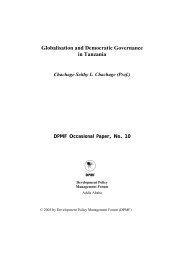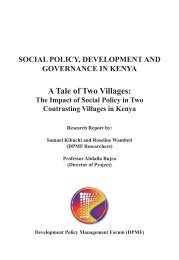From the Lagos Plan of Action (LPA) - DPMF.org
From the Lagos Plan of Action (LPA) - DPMF.org
From the Lagos Plan of Action (LPA) - DPMF.org
Create successful ePaper yourself
Turn your PDF publications into a flip-book with our unique Google optimized e-Paper software.
30 <strong>DPMF</strong> Occasional Paper No. 13while, at <strong>the</strong> same time, endorsing radical alternative economicstrategies and policies at <strong>the</strong> OAU level. Schizophrenia becamea standard political behaviour among African political leaders, abreakdown occurring between OAU resolutions, with distinctpan-African leanings, and actions taken at country level. In thisrespect, <strong>the</strong> following statement by Prime Minister MelesZenawi is quite apt:“African states have been given names such asneopatrimonial, prebential, vampire and various o<strong>the</strong>rexotic names. The underlying fact is that African states aresystems <strong>of</strong> patronage and are closely associated with rentseekingactivities. Their external relationship is designedto generate funds that oil this network <strong>of</strong> patronage. Theirtrading system is designed to collect revenue to oil <strong>the</strong>system. Much <strong>of</strong> <strong>the</strong> productive activity is mired in asystem <strong>of</strong> irrational licenses and protection that isdesigned to augment <strong>the</strong> possibilities <strong>of</strong> rent collection.Much <strong>of</strong> <strong>the</strong> private sector in <strong>the</strong> continent is an active andcentral element <strong>of</strong> this network <strong>of</strong> patronage and rentseekingactivity’ 23 .(v)Given this situation, <strong>the</strong> more <strong>the</strong> crisis deepened in Africa and<strong>the</strong> more countries became indebted, <strong>the</strong> easier it became for <strong>the</strong>externals to ensure that <strong>the</strong> traditional economic strategies andpolicies inherited from <strong>the</strong> colonial period continued to prevail.Indeed, as <strong>the</strong> crisis deepened and African countries becameweaker, <strong>the</strong> externals had a unique opportunity to intervenestrongly at country level and to direct economic strategies andpolicies, <strong>of</strong>ten literally managing and administering keyinstitutions in African economies. This was particularly <strong>the</strong> casein much <strong>of</strong> <strong>the</strong> 1980s and some would even argue this continuesto be <strong>the</strong> case at present – at least in many small countries <strong>of</strong>Africa.(vi) However, this strong interventionist role <strong>of</strong> <strong>the</strong> “externals” hadto have an ideological and intellectual basis in <strong>the</strong> new era. Andthis was provided by <strong>the</strong> WB and IMF through <strong>the</strong>ir various23 Prime Minister Meles Zenawi. 2002. Speech made at <strong>the</strong> NEPAD Symposium in AddisAbaba, 27 th May 2002. The Ethiopian Herald, June 2.




